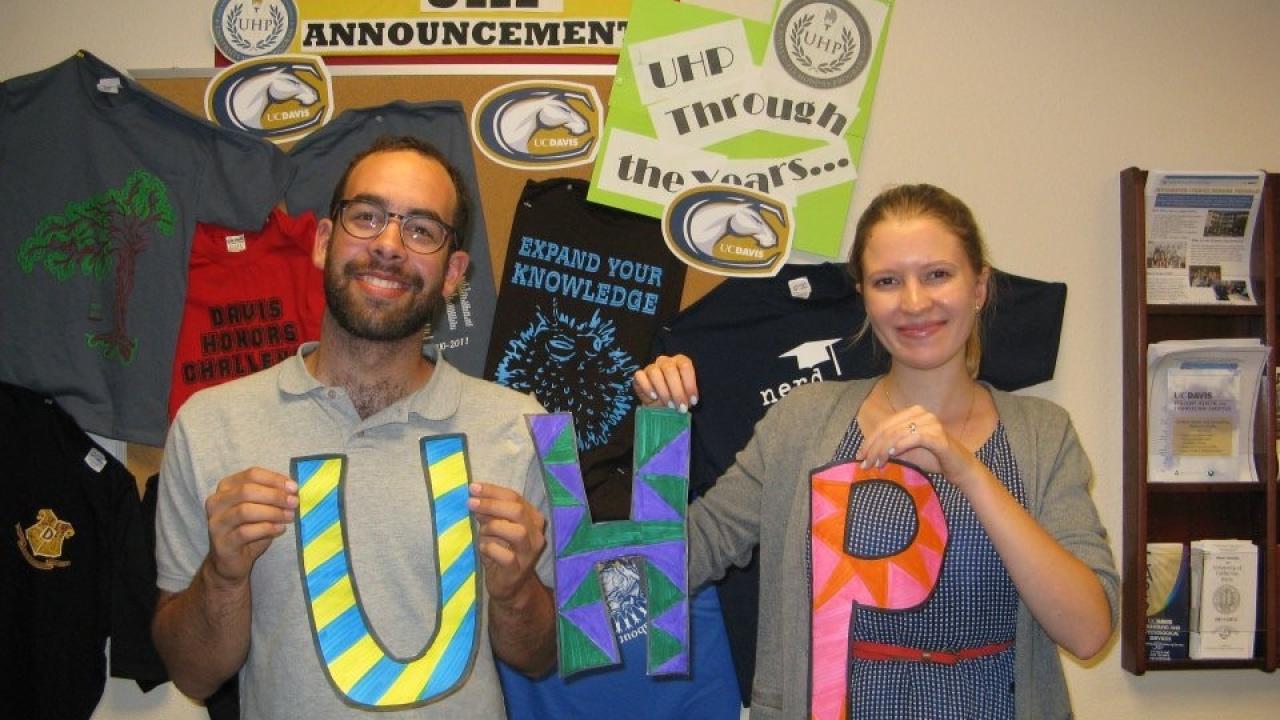
Research in Honors: the story of how one honors student accidentally completed 3 theses
By Gideon Cohn-Postar
I always wanted to be a historian, but when I arrived on campus in the Fall of 2009 I had absolutely no idea what it was that a historian did. That changed the moment I stepped into Professor Kevin Roddy’s Medieval Studies Honors Seminar.
Our only readings were primary sources, our discussions bounced around the world, and I felt like I was truly a scholar, not just a student. I am now in my fourth year of a History PhD program at Northwestern University, and looking back I truly think that the discussions that Professor Roddy led were every bit as insightful and dynamic as those of my graduate program. The only real difference is that we all incessantly quote Foucault now.
Midway through my second year at UC Davis I realized I had taken so many history courses (thanks to honors priority registration) that I was basically done with my history major. There were other classes I needed to graduate, but for the most part I was at a loss as to what I should do with the next two and a half years. My friends all advised me to take on a second major but nothing seemed to catch my attention.
Luckily for me, when I didn’t know what to do next, I happened to wander into the Honors office where Lolita and Carrie Devine suggested I consider research.
I took their advice and started small with an Honors Contract. I reached out to Professor Sudipta Sen whose class on the British Empire I’d enjoyed and mumbled through a proposal. We eventually shaped it into a research paper on the First and Second Anglo-Sikh Wars. It wasn’t great, but I was hooked. Even though I’d mostly used secondary sources in the paper it felt like I was creating new knowledge. Over the summer I worked to expand it into a full research paper and then, again with the encouragement of Honors staff, launched into an Honors Thesis.
As an example of how little awareness of the workings of the world I possessed, I didn’t know that Honors Theses were really supposed to be done by seniors… but that was the true beauty of the Honors Program to me. Honors reshaped itself when I needed it to and opened up new opportunities to me even before I knew what they were.
"That was the true beauty of the Honors Program to me. Honors reshaped itself when I needed it to and opened up new opportunities to me even before I knew what they were."
In my senior year I wrote another Honors Thesis. This time I was getting pretty good at it and wove together primary and secondary sources to explore a historical mystery that was probably only of interest to me and my advisor. I had always been curious about the workings of the British East India Company Army. At one time one of the largest military forces in the world, the Company Army was a private force, run by a company whose ostensible goal was financial profit. I was interested in how the army was standardized, particularly how its uniforms ended up looking so very much like the famous redcoats worn by regular British Army soldiers. Buried in a series of official orders bound in a book so old that the cover was falling off as I read it, I found the directives that shaped the Company Army’s appearance. The Governor-General of the Company had forced his soldiers to buy surplus red cloth from the Company’s own warehouses to save money and because he believed that standardized uniforms would make Indian soldiers, who were stereotyped as cowardly, fight better. It was a small issue—the color of a coat—but it gave me the space to write about racism, modernity, empire, and economics. I learned from that project how seemingly minor incidents in history can open up complex issues and questions.
My research interests have changed a bit- my dissertation explores the causes and consequences of economic voter intimidation in the late-nineteenth century United States. I’ve spent the last four years researching in archives in San Francisco, Kansas City (in July—the air conditioners in the archive exploded), New York City, and even in the National Archives in Washington, D.C. I love going through boxes and files. Every trip I find some new story that I can bring back to show off to my advisors and bore my friends with. Even though it’s been years since I graduated and I now live 2,000 miles away from Davis, some of the first people I share my research findings with when I emerge from the archives are the friends I made and the professors who taught me in Honors.
"The freedom to experiment, share ideas, and ask questions that I experienced in the UC Davis Honors Program was the most critical part of my college experience."
I don’t usually think about what would have happened if I had followed the conventional advice and taken on a second major instead of starting my efforts towards research. I like to think that I would be here anyway, that my love of history would have pushed me down the same path, but I’m not sure of that. What I’m certain of is that the freedom to experiment, share ideas, and ask questions that I experienced in the UC Davis Honors Program was the most critical part of my college experience. I’m grateful for those opportunities, and for the people like Kevin Roddy, Carrie Devine, Lolita Nelson-Adkins, and Sudipta Sen who made them.
